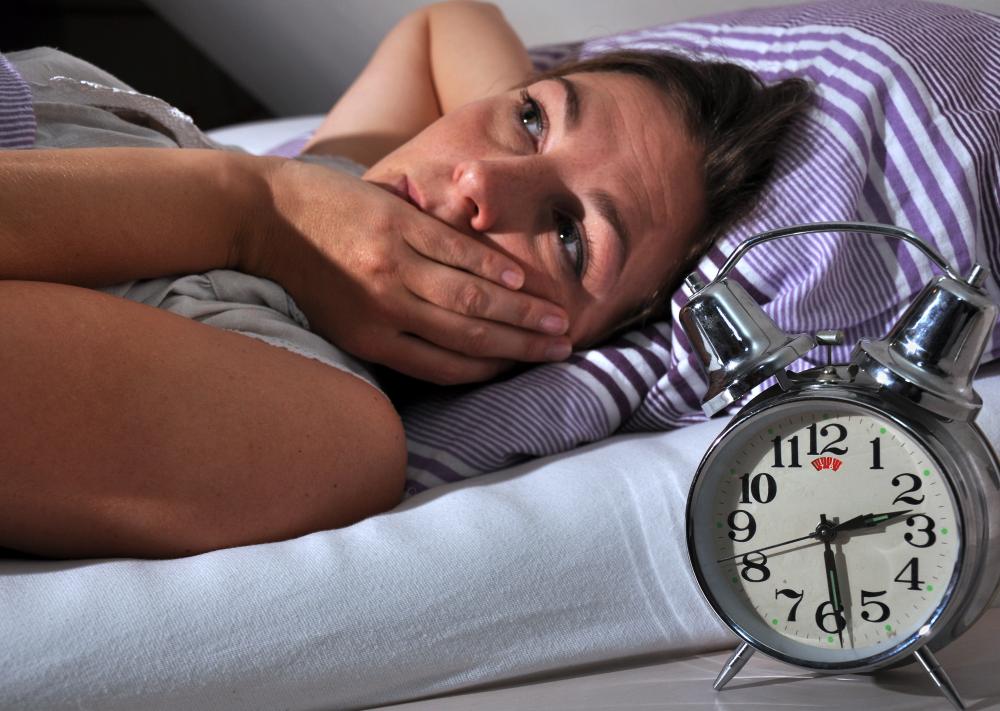At WiseGEEK, we're committed to delivering accurate, trustworthy information. Our expert-authored content is rigorously fact-checked and sourced from credible authorities. Discover how we uphold the highest standards in providing you with reliable knowledge.
What Is the Connection between Amitriptyline and Sleep?
The connection between amitriptyline and sleep is that amitriptyline increases levels of chemicals in such a way that often allows people to fall asleep more easily and stay asleep longer. Amitriptyline is a tricyclic antidepressant drug that is sometimes used as a sleeping aid for people with insomnia, or trouble sleeping. Using amitriptyline for insomnia is considered an "off-label" treatment. In other words, amitriptyline has not been specifically approved by the US Food and Drug Administration (FDA) to treat sleep disorders, but it is generally considered a safe course of treatment that is effective for at least some patients.
Like most antidepressants, amitriptyline works by increasing the level of certain chemicals in the brain responsible for producing feelings of happiness. In the case of amitriptyline, the chemicals, or neurotransmitters, effected are serotonin and norepinephrine. Tricyclic antidepressants like amitriptyline have largely been replaced by more modern drugs that produce similar results, but with fewer side effects.

Amitriptyline and sleep are related in that depression and insomnia often go hand in hand. The exact reasons for this are not known, but there is some evidence that increased wakefulness leads to more serotonin production. If this is the case, insomnia may be the body's way of treating depression on its own. Amitriptyline or other antidepressants may reduce the body's need to produce serotonin through wakefulness. Whatever the reason, some patients are able to take amitriptyline and sleep through the night more easily than if they had not taken it.

One reason amitriptyline may be preferred to other insomnia treatments is that it remains in the body longer than most over-the-counter sleep aids. Its half-life — the amount of time that it takes for half of the medicine to be processed in the body — is about 12 to 24 hours, as compared to anywhere from less than two hours to nine hours for similar medications. This makes amitriptyline a good option for people with early-waking insomnia, a condition in which the patient is usually able to fall asleep in a reasonable amount of time, but is unable to stay asleep.

On the other hand, the connection between amitriptyline and sleep is weak enough in some patients to be ineffective. It may also have side effects, such as dizziness or drowsiness in the morning. Patients seeking treatment for insomnia should discuss all potential risks and benefits with a doctor or pharmacist.
AS FEATURED ON:
AS FEATURED ON:













Discussion Comments
For a medication that wasn't even made for insomnia in the first place, amitriptyline is pretty good. It does cause a lot of drowsiness in the morning though. It doesn't wear off quickly.
@ZipLine-- I don't think that any medication can cure insomnia altogether. If something works relatively well with few side effects, I think that's the best we can hope for.
Amitriptyline works quite well for me. I get a good night's sleep on it. My insomnia is triggered by stress and I think that amitriptyline works because it's very relaxing. If the cause of insomnia is different, it might not work as well.
I think you need to talk to your doctor about your experience with amitriptyline. Adjusting the dose might be helpful.
I've been on amitriptyline for insomnia for a few months now. I can't say that it's a wonder drug. It does help me fall asleep and I get about three hours before waking up again. This is better than before though, when I was literally not getting any sleep. I would dose off for fifteen or twenty minutes at most.
So I am glad that I'm on amitriptyline and getting better sleep, but I'm still not where I would like to be. My goal is five or six hours of undisturbed sleep without a lot of drowsiness or grogginess in the morning. Unfortunately, I don't think I'm going to get it on this medication.
My search for a cure continues.
Post your comments